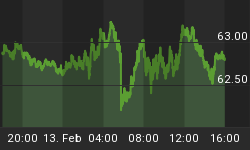The following is part of Pivotal Events that was published for our subscribers Thursday, March 27, 2008.
SIGNS OF THE TIMES:
Last Year:
"Pension funds are under pressure to shift more money into bonds in order to more closely match their liabilities, but they are trying to lift returns. These twin goals have helped fuel an explosion of new aggressive fixed-income strategies using leverage, and derivatives."
This was from the head of fixed income at Barclays who continued with "The confluence of these trends and the momentum, the rapid evolution of products as well as the new strategies, is making fixed-income look more like equities. The new strategies also include collateralized loan obligations, currencies, and credit default swaps."
- Financial Post, April 4, 2007
It would have been much simpler to report that pension fund managers were "Reaching for yield". Never mind all the rationalizations.
"Dallas Fed President said that central bankers still have 'more work to do' and will be 'especially vigilant' on inflation."
- Financial Post, April 11, 2007
With the sharpest decline in home prices and the greatest financial volatility since the 1930s, central bankers are probably "vigilant" to any possibility.
* * * * *
This Year:
"In recent years, bankers have succumbed to the idea that the credit world was all about numbers and complex computer models. These days, however, this assumption looks ever more of a falsehood. For as anyone with a classical education knows, credit takes its root from the Latin word credere ("to trust") And as the current credit turmoil now mutates into ever-more virulent forms, it is faith - or, rather, the lack of it - that has turned a subprime squall into a what is arguably the worst financial crisis in seven decades. Make no mistake: what we are witnessing right now is not just a collapse of faith in one single institution (namely Bear Stearns) or even an asset class (those dodgy subprime mortgage bonds). Instead, it stems from a loss of trust in the whole style of modern finance, with all its complex slicing and dicing of risk into ever-more opaque forms. And this trend is not just damaging the credibility of banks, but the aura of omnipotence that has enveloped institutions such as the US Federal Reserve in recent years."
- Financial Times, March 17, 2008
"Just six months ago, Chinese property developers were on a shopping spree, dipping deep and borrowing heavily to snap up more, and expensive, pieces of land. How quickly things have changed.
Three months into 2008, China's developers are under siege."
"This game is over."
- Wall Street Journal, March 26, 2008
"Crunch Bounces Around in Australia"
- Wall Street Journal. March 26, 2008
These, along with news that Iceland's credit market is frozen up and that the krona is down 20% since the first of the year, is confirming the geographical nature of credit.
* * * * *
Tales From The Crypt:
"General sentiment regarding business prospects has been growing optimistic. Meanwhile, there are indications that the Federal Reserve authorities continue to adopt a benevolent policy."
- The Economist, December 21, 1929
"Mr. Hoover's statements on the economy are generally disliked. The prospects of higher taxation is discouraging and public statements by the government cause a suspicion that it is whistling to keep up its courage."
- The Economist, March 1, 1930
"It will be interesting to see the extent to which the American banking amalgamation movement continues in the very different circumstances that now obtain as compared with last year."
"There is a growing belief that there will be no prolonged business depression, in which case low interest rates will make the current high yields on assured dividend-paying stocks attractive."
- The Economist, March 22, 1930
Gold Sector: Once again the behaviour of the silver/gold ratio anticipated an important top for gold and silver.
The silver/gold ratio increases as speculation soars and when it reverses the top for both is typically set within two weeks. This time around the ratio turned on March 6 and the highs were on March 17.
Another important part of the pattern is that when the RSI on the ratio gets above 85 it is close to reversing, and this time it got to 88.9. Now, when this reverses gold shares will usually decline from around that day by more than 20 per cent in two months.
As it happened, the XAU, for example, plunged 19% in a week, and has enjoyed a rebound. This is a test of the high and there is more downside - in price and time.
On this decline, silver will likely underperform gold and silver stocks will likely underperform gold stocks.
However, as this post-bubble contraction continues jewelry consumption will decline significantly and this will dismay orthodox researchers who consider this to be the key offtake of gold. Not to worry! The investment demand, typically overwhelms this as the real price increases.
At the turn of the year, our strategy was to begin selling senior golds in order to buy the juniors on opportunity. We kept writing about providing a select list of exploration bets, but due to malaise in the sector have yet to publish a list.
At some point these will have their day and we hope to be there.
Link to Friday, March 28th 'Bob and Phil Show' on Howestreet.com:
http://www.howestreet.com/index.php?pl=/goldradio/index.php/mediaplayer/823
















